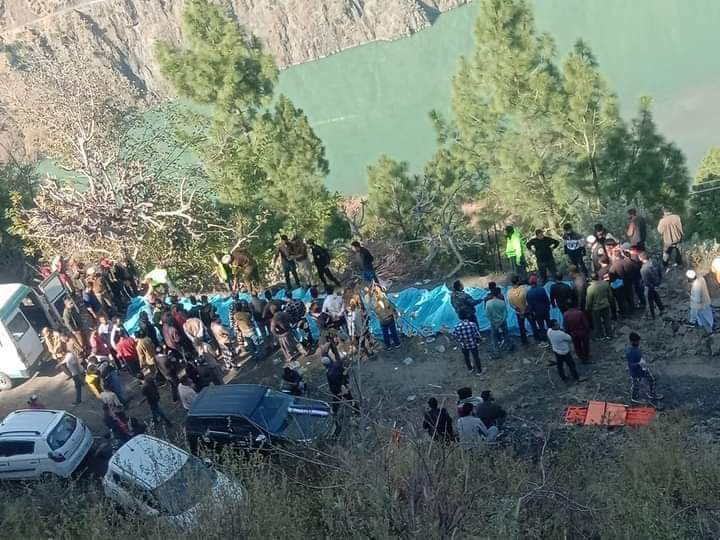
The road accident in Chenab Valley has become a grim reaper, claiming the lives of thousands due to reckless driving and the operation of ill-fated vehicles on Chenab Valley routes. A recent horrifying incident on the “Batote Kishtwar National Highway 244” near the Trangul Assar area of the Doda district resulted in the tragic loss of over four dozen lives. This heart-wrenching accident, where a passenger vehicle lost control and rolled into a deep gorge, is sadly one in a series of accidents that have plagued the Chenab region for decades.
The inadequate services in the Chenab Valley have led to negligent driving and the operation of ill-fated vehicles, resulting in frequent accidents. Passengers traveling in buses and other commuter services have lost their lives unjustly as they merely commute for their daily needs. Accidents are often attributed to overloading, reckless driving, cellphone use, and the poor condition of the roads. The recent surge in accidents has also been exacerbated by the deplorable state of the roads, with interdistrict roads of Kishtwar and Doda being glaring examples.
The government and its agencies only seem to wake up to the situation after a major accident occurs, as seen in the aftermath of the Assar incident. The authorities announce half-hearted measures and promise to improve road conditions and commuter services, but these commitments often fade away once public anger subsides. The historical lack of effort to enhance commuter services in the Chenab region, where dependable transport operations are absent, has been a persistent issue.
“Interdistrict routes of Chenab Valley have become a daily death trap due to the plying of ill-fated vehicles, as no precautionary measures have been taken for a long time. Negligence and untrained drivers contribute to the increasing traffic accidents, turning the roads into killers and death traps, claiming more lives than violence in Jammu and Kashmir. Fatal accidents occur daily on Jammu Srinagar, Jammu Poonch, Jammu Kishtwar Highways, including Chenab Valley, and other peripheral roads, resulting in dozens or more lives lost. Authorities are seen doing little or nothing to improve road conditions or penalize drivers for reckless driving and the operation of ill-fated vehicles, only acting after major tragedies occur. The figures for road accidents are staggering, but the response from controlling agencies in checking the ‘Dance of Death’ on the roads is too little, and it lasts only a few days after such incidents.”
The political representatives of Chenab Valley seem to be passive observers, with no comprehensive policy framed to take precautionary measures and avoid such tragedies. Traffic police are accused of collecting bribes on the pretext of weekly or monthly entry permits from transporters and drivers, allowing them to board passengers as they wish. Corruption within the traffic police and condolence messages from politicians have become routine, as they await accidents to showcase their existence on social media.
Unfortunately, Chenab Valley has witnessed several tragic accidents in recent years, resulting in the untimely deaths of thousands of precious lives. Slide-prone areas, violation of traffic rules, overloading, reckless driving, and the use of ill-fated vehicles have all contributed to these accidents. The government, however, has failed to address the root causes and take swift action to ensure better road connectivity and the operation of modern vehicles in Chenab Valley and other regions.
The roads of the twin districts, Kishtwar and Doda, have turned into death traps. For years, those in power have ignored this critical issue, taking no action against negligent elements within the administration and failing to address the root causes of these tragedies. The highest number of road mishaps occurs in the Chenab Valley region, comprising three districts: Kishtwar, Doda, and Ramban. Commuters on the highways, especially on the Jammu Srinagar, Jammu Poonch, Jammu Kishtwar, and Chenab Valley routes, remain under constant threat due to landslides and other hazards.
“All the inter-district routes in Chenab Valley have become accident-prone, with no checkpoints to curb overloading, reckless driving, and the use of mobile phones. The valley has lost numerous lives in traffic accidents, and within a month, every single day witnesses precious lives lost. Representatives of the twin districts bear responsibility for such incidents, as they have failed to implement measures to prevent traffic accidents in Chenab Valley. Thathri Kilhotran, Thathri Bunjwah, Kishtwar Chatroo, Kishtwar Padder, Doda Bhaderwah, and various other routes of Chenab Valley demand attention. Overloading and reckless driving need to be checked at every checkpoint within a radius of 10 km.”
The surge in road traffic without a corresponding increase in the road network has been another factor contributing to traffic mishaps. Representatives and authorities must collaborate to formulate corrective and collective measures that can save thousands of precious lives lost in avoidable road accidents. Most accidents are blamed on overloading, reckless and negligent driving, making it crucial to follow safe driving rules to prevent accidents.
“Should cellphones be banned while driving?” asks Dr. Daisy Parihar, a renowned medical officer. She emphasizes that administrative forces need to take strong action against careless driving. Accidents often result from negligence while driving, and mobile phones can be significant contributors to distracted driving. Strict rules, hefty fines, and license penalties are essential steps to deter individuals from using mobile phones while driving. Poor road conditions, including uneven surfaces and lack of maintenance, contribute to accidents. The tragic effects of accidents on families are profound, and improving safety measures, including installing highway guardrails, is crucial.
“The installation of these safety measures is taken for granted. A single careless driver causes damage to multiple innocent lives. No doctor in their right senses would intentionally harm a patient. Yet, corrupt builders and contractors misuse funds intended for road construction and improvement.”
“A routine has developed in Chenab Valley, where tragic accidents occur regularly, resulting in the loss of precious lives. Today, again, 39 people have lost their lives, but this will not be the last accident. Accidents will happen again, leading to a renewed outcry. Some will blame the police, traffic, and execution agencies, but the ultimate responsibility lies with the people and drivers of these vehicles.”
“The road is good, except for some patches under construction. The observed issues are bad drivers and bad vehicles. Drivers are not taking responsibility, playing with people’s lives. They lack driving sense, manners, and often disregard safe driving norms. Some are not fully trained and drive vehicles without following safety norms. If drivers do not use their senses and follow safe driving rules, similar accidents may happen in the future. People in Chenab Valley are strong and courageous, but they must use their senses along with their strength.”
The government must rise to the occasion, implementing measures to ban ill-fated vehicles, ensure proper documentation, and install heavy barricades and concrete parapets across Chenab Valley. This collective effort is necessary to make a significant difference on the ground and save precious lives.
{The author, Shafqat Sheikh, is a resident of Bunjwah Kishtwar and a Freelance Writer and Columnist. He can be reached at freelancershafqat@gmail.com, +919419974577}.




